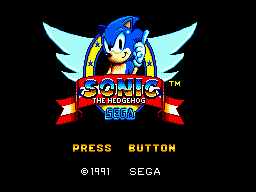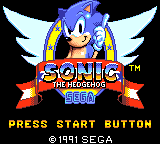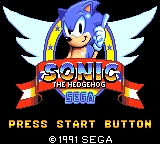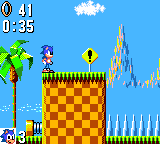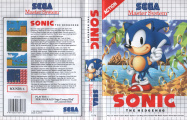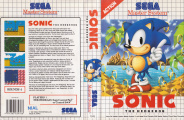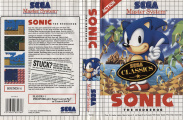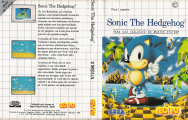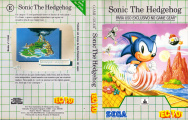Sonic the Hedgehog (8-bit)
From Sonic Retro
(Redirected from Sonic the Hedgehog (Game Gear))
| Sonic the Hedgehog | |||||||||||||||||||||||||||||||||||||||||||||||||||||||||||||||||||||||||||||||||||||||||||||||||||||||||||||||||||||||||||||||||||||||
|---|---|---|---|---|---|---|---|---|---|---|---|---|---|---|---|---|---|---|---|---|---|---|---|---|---|---|---|---|---|---|---|---|---|---|---|---|---|---|---|---|---|---|---|---|---|---|---|---|---|---|---|---|---|---|---|---|---|---|---|---|---|---|---|---|---|---|---|---|---|---|---|---|---|---|---|---|---|---|---|---|---|---|---|---|---|---|---|---|---|---|---|---|---|---|---|---|---|---|---|---|---|---|---|---|---|---|---|---|---|---|---|---|---|---|---|---|---|---|---|---|---|---|---|---|---|---|---|---|---|---|---|---|---|---|---|
| System(s): Sega Master System, Sega Game Gear, Palm OS, Virtual Console | |||||||||||||||||||||||||||||||||||||||||||||||||||||||||||||||||||||||||||||||||||||||||||||||||||||||||||||||||||||||||||||||||||||||
| Publisher: Sega | |||||||||||||||||||||||||||||||||||||||||||||||||||||||||||||||||||||||||||||||||||||||||||||||||||||||||||||||||||||||||||||||||||||||
| Developer: Ancient M2[1][2] | |||||||||||||||||||||||||||||||||||||||||||||||||||||||||||||||||||||||||||||||||||||||||||||||||||||||||||||||||||||||||||||||||||||||
| Genre: Action[3][4][5] | |||||||||||||||||||||||||||||||||||||||||||||||||||||||||||||||||||||||||||||||||||||||||||||||||||||||||||||||||||||||||||||||||||||||
| Number of players: 1 | |||||||||||||||||||||||||||||||||||||||||||||||||||||||||||||||||||||||||||||||||||||||||||||||||||||||||||||||||||||||||||||||||||||||
|
Sonic the Hedgehog (ソニック・ザ・ヘッジホッグ) is a Sega Master System and Sega Game Gear "8-bit" counterpart to the Sega Mega Drive game of the same name. It was released in October and December 1991, respectively.
The 8-bit Sonic the Hedgehog is a very loose "port" of the Mega Drive version, with similar, albeit simplified gameplay and a partially different set of levels (all with new layouts). Though overseen by Sonic Team, most of the game was created by an external development studio, Ancient, in their first collaboration with Sega. This version of Sonic the Hedgehog also stands as the first handheld Sonic game.
Contents
Story
As was the norm with the early Sonic games, the plot is simple. Dr. Eggman is menacing South Island and imprisoning animals in Badniks; the heroic hedgehog, Sonic, sets out to defeat him, potentially collecting 6 Chaos Emeralds along the way. After Sonic fights his way to Scrap Brain Zone, Eggman's factory-city on South Island's summit, the Doctor escapes to an airship (Sky Base Zone), where Sonic finally defeats him in the last boss fight. Eggman escapes by teleporter; Sonic jumps in after him and is transported back to Green Hill Zone. If the 6 Chaos Emeralds have been collected, the gems then spiral up into the air and cleanse the black smog and pollution off the island.
Gameplay
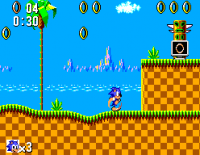
The gameplay is similar to that of the Mega Drive version; Sonic's abilities and the items available are the same. Although the gameplay is similar, it is slower than its 16-bit counterpart. There are some differences however: Checkpoints take the form of point arrow monitors rather than posts. Chaos Emeralds aren't found in Special Stages; rather, one is hidden in each of the six regular Zones. The Special Stages exist merely as a bonus stage where players can collect Continues and Extra Lives, and no additional reward is given for collecting all items.
Three of the Zones come from the Mega Drive version of the game. Bridge Zone and Jungle Zone are considered unusual today for Sonic the Hedgehog Zones. However, this was Sonic's second game, so such norms hadn't been established yet. Each Zone has three Acts; the first two Acts are standard levels, while the third Act is merely a short run up to the boss and contains no Rings. The three Zones titled after their Mega Drive counterparts feature 8-bit renditions of the scenery, but have unique level layouts and, with the exception of Green Hill Zone, different music courtesy of Yuzo Koshiro, best known for his work on games such as The Revenge of Shinobi and Streets of Rage.
Like in the Mega Drive version, the player can collect 100 Rings to earn an extra life; but in the 8-bit version, the Ring counter resets to 00 rather than increasing past 99. When the Ring counter has rolled over, Sonic is treated as if he had no Rings at all, thus is vulnerable to losing a life unless he gets another Ring or has a Shield. Additionally, Rings dropped after taking a hit cannot be re-collected.
Bonus Panel
At the end of Acts 1 and 2 of each Zone, the player has to spin a Bonus Panel to clear the Act, with a reward given based on what it lands on:
| Dr. Eggman | |
|---|---|
| No prize is awarded. This panel comes up most often in the game, provided the player's Ring count is below 50. | |
| Ring | |
| 10 Rings are added to the player's final Ring tally. In the Master System version it is awarded if the player ends the Act with 0, 10, 20 or 30 Rings. They can't get this panel in Scrap Brain Zone, nor in Sky Base Zone Act 1. However, it always appears in Sky Base Zone Act 2. In the Game Gear version it is awarded if the player dies twice in an Act. | |
| Sonic | |
| An extra life is awarded. In the Master System version, it appears if the player ends the Act with an amount of Rings that varies by Act (see table below). In the Game Gear version it is awarded if the player dies three times in an Act. | |
| Exclamation Point | |
| Warp to the Special Stage. Appears if 50 or more Rings are on hand when passing the sign. The player can't get this panel in Scrap Brain Zone nor in Sky Base Zone. |
In the Master System version, the number of Rings required to earn an extra life from the Bonus Panel are as follows:
| Zone | Act 1 | Act 2 |
|---|---|---|
| Green Hill Zone | 11~19 | 21~29 |
| Bridge Zone | 41~49 | 11~19 |
| Jungle Zone | 31~39 | 41~49 |
| Labyrinth Zone | 21~29 | 31~39 |
| Scrap Brain Zone | 11~19 | 21~29 |
| Sky Base Zone | 41~49 | N/A |
Scoring
Enemies: 100 points.
End Level Ring Bonus: 100 points for each Ring held at the end of an Act. Because the Ring counter resets past 99, the maximum possible bonus is 9,900.
End Level Time Bonus:
- 0:19 or less = 300,000
- 0:20 = 200,000
- 0:21 = 100,000
- 0:22 = 80,000
- 0:23 = 50,000
- 0:24 = 40,000
- 0:25 to 0:29 = 30,000
- 0:30 to 0:59 = 10,000
- 1:00 to 1:29 = 5,000
- 1:30 to 1:59 = 3,000
- 2:00 to 2:29 = 1,000
- 2:30 to 2:59 = 500
- 3:00 to 4:59 = 100
- 5:00 or more = 0
Chaos Emerald Bonus: 20,000 points for each Chaos Emerald collected, awarded at the end of the game.
Sonic Left Bonus: 5,000 points for each life remaining at the end of the game.
Special Bonus: Miscellaneous bonus points awarded at the end of the game for certain achievements. The maximum possible Special Bonus is 500,000. The achievements and their bonuses are as follows:
- 50,000 points for collecting all 6 Chaos Emeralds.
- 50,000 points for collecting all 18 1-Up monitors (Special Stage 1-Up monitors don't count).
- 50,000 points for playing all 8 Special Stages.
- 50,000 points for completing all 8 Special Stages.
- 100,000 points for not losing any lives.
- 200,000 points for achieving all of the above.
History
Development
| |
Main article: Sonic the Hedgehog (8-bit)/Development |
Versions
The Game Gear version has a smaller screen resolution, but a larger colour palette. Sonic's sprite is smaller and the control feels lighter. In the first Zone of the Game Gear version, warning signs have been placed as the high speed combined with the narrow screen can cause problems. Jungle Zone Act 2 allows for vertical descent without losing a life in the Game Gear version, which makes this stage easier.
Labyrinth Zone's level design is different in the Game Gear version as well, with the Chaos Emerald now in a new location. Several bosses, including the final, were modified or even replaced, making them easier than their Master System counterparts. The bonus stages were also redesigned. The Game Gear version uses a Sega splash screen with a jumping Sonic sprite, whereas the Master System version lacks a Sega splash screen entirely as it is handled by the boot ROM instead.
The Master System version was also distributed as a built-in game in certain Master System II systems sold in Europe. To play the game, the user must turn on the system without a cartridge inserted.
Comparisons
| |
Main article: Sonic the Hedgehog (8-bit)/Comparisons |
Also released on
- Sonic Adventure DX: Director's Cut for the GameCube and PC (Game Gear) (2003-2004)
- Sonic Mega Collection Plus for the PlayStation 2, Xbox, and PC (Game Gear) (2004-2005)
- Sonic Mega Collection Plus & Super Monkey Ball Deluxe for the Xbox (Game Gear) (2005)
- Virtual Console on Wii (Master System) (2008)
- Tectoy Master System 3 for the Tectoy Plug and play console (Master System) (2008)
- Sega Fun Pack: Sonic Mega Collection Plus & Shadow the Hedgehog for the PlayStation 2 (Game Gear) (2009)
- Sonic PC Collection for the PC (Game Gear) (2009)
- Virtual Console for the Nintendo 3DS (Game Gear) (2013)
- Game Gear Micro, black model (Game Gear) (2020)
- Sonic Origins Plus for PlayStation 4, PlayStation 5, Xbox One, Xbox Series X, Nintendo Switch, Steam and Epic Games Store (Game Gear) (2023)
Production credits
Master System version
Sonic the Hedgehog Original Character Design: ©Sega
- Game Program: Shinobu Hayashi
- Graphic Design: Ayano Koshiro, Takefuni Yunoue
- Sound Produce: Masato Nakamura
- Rearrange and Original Music: Yuzo Koshiro
- Source: In-game credits[26]
Game Gear version
- Game Programmer: Shinobu "Machine" Hayashi
- Graphic Designers: Ayano Koshiro, Takefuni Yunoue
- Sound Producer: Masato Nakamura
- Re-Arranging and Original Music: Yuzo Koshiro
- Source: In-game credits[27]
Manuals
| |
Main article: Sonic the Hedgehog (8-bit)/Manuals |
Magazine articles
| |
Main article: sega:Sonic the Hedgehog (8-bit)/Magazine articles |
Artwork
Physical scans
Master System version
| Master System, EU/US |
|---|
| |
| Master System, AU (NIAL sticker) |
|---|
| |
| Master System, BR |
|---|
| |
Game Gear version
| Game Gear, JP |
|---|
| |
| Game Gear, JP (Meisaku Collection) |
|---|
| Game Gear, US |
|---|
| |
| Game Gear, EU |
|---|
| |
| Game Gear, BR |
|---|
| |
| Game Gear, PT |
|---|
|
|
Technical information
ROM dump status
| System | Hash | Size | Build Date | Source | Comments | |||||||||
|---|---|---|---|---|---|---|---|---|---|---|---|---|---|---|
| ✔ |
|
256kB | Cartridge (US/EU/BR) | |||||||||||
| ✔ |
|
256kB | Cartridge (US/JP) | Revision 00 | ||||||||||
| ✔ |
|
256kB | Cartridge (EU/JP/BR) | Revision 01 | ||||||||||
| ✔ |
|
256kB | 3DS Virtual Console (World) | Revision 01 | |
|||||||||
| ✔ |
|
256kB | EPROM cartridge[28] | Prototype | |
External links
- Sega of Japan Virtual Console page (Japanese)
- Sega of Japan 3DS Virtual Console page
- Nintendo catalogue pages: Wii Virtual Console: US, AU; Nintendo 3DS Virtual Console: JP, US, UK
References
- ↑ https://www.mtwo.co.jp/development/retrogame-2/#tab-2 (Wayback Machine: 2014-04-03 00:26)
- ↑ https://www.mtwo.co.jp/development/retrogame-2/#tab-4 (Wayback Machine: 2014-04-03 00:26)
- ↑ File:Sonic1gg-box-eu back.jpg
- ↑ 4.0 4.1 https://sega.jp/history/hard/gamegear/software.html (Wayback Machine: 2018-12-07 04:57)
- ↑ File:Sonic1ms-box-eu.jpg
- ↑ [gamepro, issue 29, page 112 gamepro, issue 29, page 112]
- ↑ [gamepro, issue 29, page 110 gamepro, issue 29, page 110]
- ↑ [cvg, issue 121, page 34 cvg, issue 121, page 34]
- ↑ [segapower, issue 27, page 23 segapower, issue 27, page 23]
- ↑ [supergame, issue 8, page 43 supergame, issue 8, page 43]
- ↑ [ace, issue 54, page 87 ace, issue 54, page 87]
- ↑ [segapower, issue 29, page 47 segapower, issue 29, page 47]
- ↑ [supergame, issue 7, page 29 supergame, issue 7, page 29]
- ↑ http://www.sega.com/palm/purchase/buy_select_sonic.jhtml (Wayback Machine: 2003-04-17 05:05)
- ↑ https://www.nintendo.co.jp/wii/vc/software/08.html (Wayback Machine: 2018-03-06 23:35)
- ↑ http://vc.sega.jp:80/vc_ms_sonic/ (Wayback Machine: 2008-08-07 00:12)
- ↑ 17.0 17.1 http://www.nintendo.com/games/detail/y0VeAVFtYXeter7r2F5Hkl-WSXgPIAAP (Wayback Machine: 2010-11-23 00:36)
- ↑ 18.0 18.1 http://www.nintendolife.com/games/mastersystem/sonic_the_hedgehog (Wayback Machine: 2017-07-04 13:10)
- ↑ http://www.nintendo.com.au/index.php?action=catalogue&prodcat_id=42&prod_id=19903&pageID=4 (Wayback Machine: 2012-03-28 01:11)
- ↑ 20.0 20.1 http://vc.sega.jp/3ds/sonic1/ (Wayback Machine: 2014-04-06 07:17)
- ↑ 21.0 21.1 http://www.nintendo.com:80/games/detail/4lFd-f60QAnio7SNDl4scM2mr7uUexvw (Wayback Machine: 2013-06-16 16:32)
- ↑ https://www.nintendo.fr/Jeux/SEGA-Game-Gear/Sonic-the-Hedgehog-764867.html (archive.today)
- ↑ 23.0 23.1 23.2 http://www.nintendolife.com:80/games/gamegear/sonic_the_hedgehog (Wayback Machine: 2017-09-09 21:42)
- ↑ https://www.nintendo.co.uk/Games/SEGA-Game-Gear/Sonic-the-Hedgehog-764867.html (archive.today)
- ↑ https://www.nintendo.de/Spiele/SEGA-Game-Gear/Sonic-the-Hedgehog-764867.html (archive.today)
- ↑ File:Sonic the Hedgehog SMS credits.pdf
- ↑ File:Sonic the Hedgehog v1.1 GG credits.pdf
| Sonic the Hedgehog (8-bit) | |
|---|---|
|
Manuals |
show;hide
|
| Sonic the Hedgehog games for the following systems | |
|---|---|
| 1991 Sonic the Hedgehog 1992 Sonic the Hedgehog 2 1993 Sonic Chaos | Dr. Robotnik's Mean Bean Machine 1994 Sonic Drift | Sonic Spinball | Sonic the Hedgehog Triple Trouble 1995 Sonic Drift 2 | Tails' Skypatrol | Tails Adventures | Sonic Labyrinth | Sonic 2 in 1 1996 Sonic Blast Prototypes Sonic the Hedgehog (Game Gear prototype) | Sonic Chaos prereleases | Sonic Spinball (8-bit) prereleases | Sonic Triple Trouble prereleases | Sonic Blast prereleases Unreleased Sonic's Edusoft
| |
